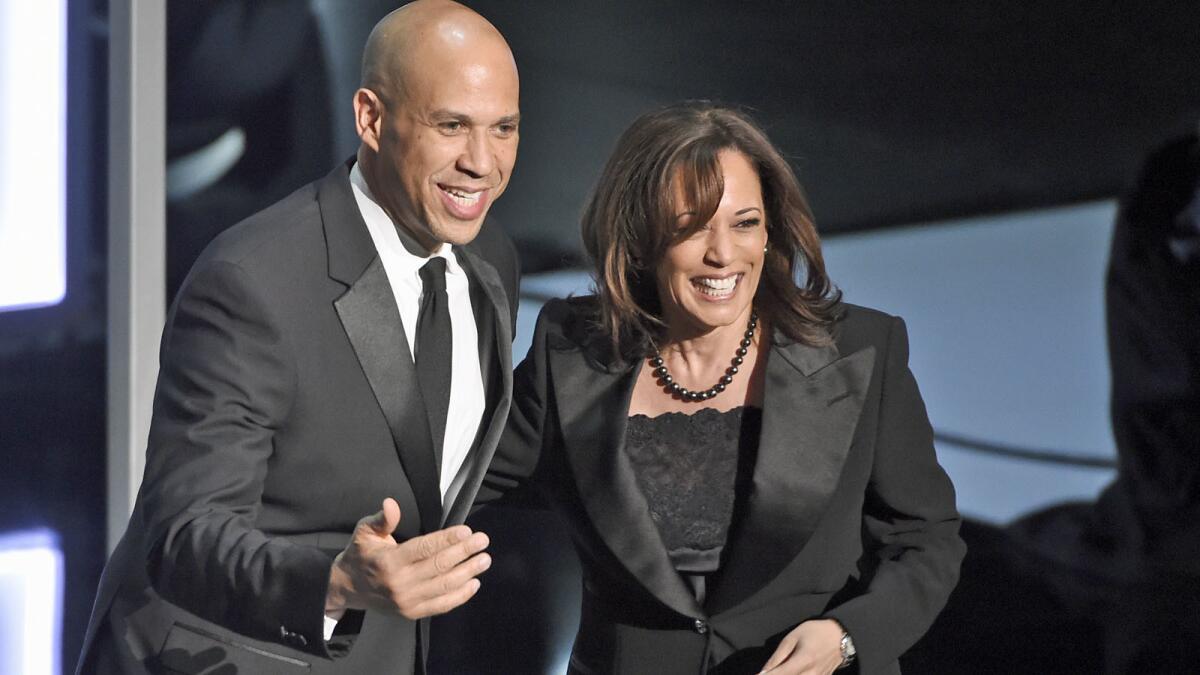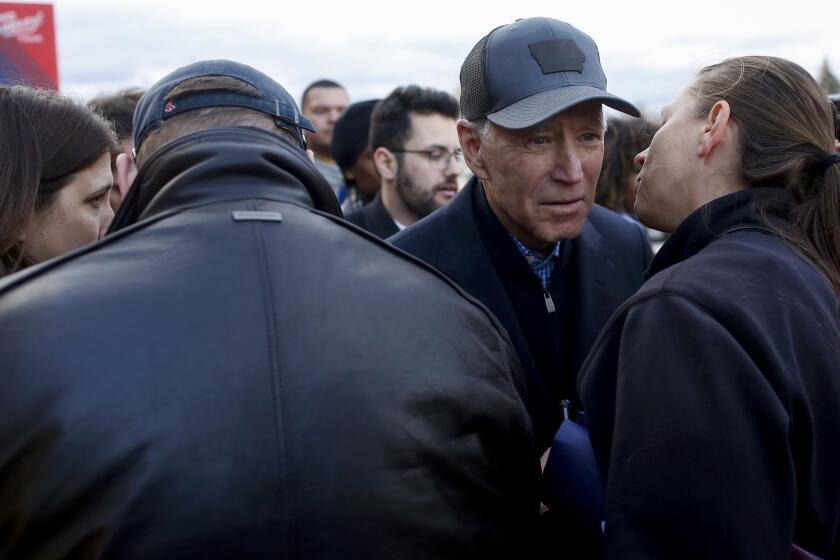Democrats value diversity, but the presidential field is increasingly white

- Share via
WASHINGTON — Kamala Harris’ abrupt exit from the presidential race Tuesday underscored how in this election cycle, where Democrats have placed a particularly high value on diversity and inclusion, they are left with a slate of presidential candidates dominated by white men.
The California senator was the only black woman in the contest, and her frank talk about racial justice was a major theme for a Democratic electorate that is increasingly nonwhite. But what started out as a campaign that looked like it would reflect the diversity of America is settling into one increasingly without minority voices at the top.
With Harris out of the race, not a single person of color has qualified so far to be onstage when Democrats meet to debate before a national audience in Los Angeles later this month. There is still time for minority candidates such as Sen. Cory Booker of New Jersey or entrepreneur Andrew Yang to make the stage, but even if they do, both candidates have been stuck near the bottom of the polls.
“What we’re staring at is a DNC debate stage with no people of color on it. That does not reflect the diversity of our party or our country. We need to do better than that,” former Housing secretary Julián Castro said after Harris’ withdrawal.
In addition to the top candidates all being white, three are in their 70s — former Vice President Joe Biden, Vermont Sen. Bernie Sanders and Massachusetts Sen. Elizabeth Warren. The other one, 37-year-old Pete Buttigieg, the openly gay mayor of South Bend, Ind., does bring a measure of diversity to the field, and Sanders, if elected, would be the country’s first Jewish president — but those moves away from the traditional resume of a presidential candidate are far too little in the eyes of many party activists.
Among centrist voters inclined to like Biden, the 37-year-old Buttigieg is becoming plausible as an alternative, and he highlights what Biden is not: energetic, articulate and young.
“The Democratic field became much less diverse today, after the only black woman in the presidential race dropped out,” Aimee Allison, founder of She the People, an advocacy group that promotes women of color in politics, said in a statement.
“Kamala’s presence in the race helped blaze a trail for the next generation of women of color. She ran a competitive campaign that has forced us to rethink what it means to be electable.”
The absence of any candidate of color in the top tier is a point of consternation for many Democrats at a time when African American and Latino voters have become some of the party’s biggest constituencies and crucial to its hopes of defeating President Trump.
“No matter your candidate, you have to recognize that going from the most diverse field ever in January to a potentially all-white debate stage in December is catastrophic,” said Leah Greenberg, co-founder of Indivisible, a Democratic activist group. “The implicit racism and sexism of ‘electability’ is deeply damaging to democracy.”
That is a point Harris and Booker argued during the November debate in Atlanta.
“Black voters are pissed off, and they’re worried,” Booker said at the debate. “We don’t want to see people miss this opportunity and lose because we are nominating someone that isn’t trusted.”
Noting that Trump won the crucial state of Wisconsin in 2016 in part because black turnout dropped in Milwaukee, he added, “We need to have someone who can inspire ... African American voters to the polls in record numbers.”
At the same time, however, a chief reason for the problems both Harris and Booker have encountered involves the choice that African American voters have made to stand by Biden.
Both Booker and Harris were counting on their biographies and longtime advocacy for racial justice to resonate with black and Latino voters in the crucial early voting states of South Carolina and Nevada, and also in California, the first big state to vote that reflects the national diversity of the party.
But they failed to anticipate the steadiness of Biden’s support among black voters. Although Biden has declined in polls, especially in Iowa and New Hampshire, which hold the first two contests in the nominating process, that decline has come among white voters.
The former vice president’s support in places like South Carolina has remained firm, which limited the ability of either Harris or Booker to expand their backing.
As a result, the discussions among voters and the candidates still remain focused on issues of concern to people of color, but the candidates talking about those issues are increasingly all white. That could prove a turnoff to minority voters whom the Democrats desperately need to turn out in November 2020.
More to Read
Get the L.A. Times Politics newsletter
Deeply reported insights into legislation, politics and policy from Sacramento, Washington and beyond. In your inbox twice per week.
You may occasionally receive promotional content from the Los Angeles Times.













